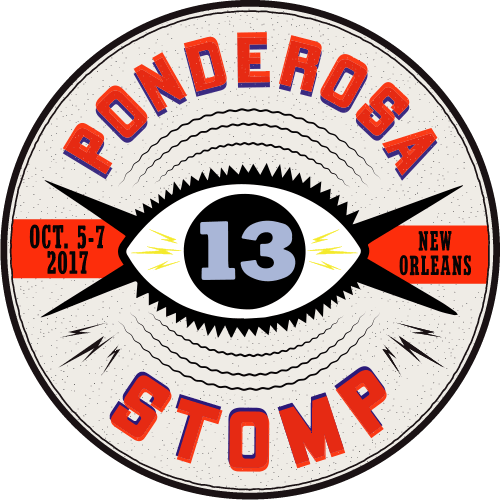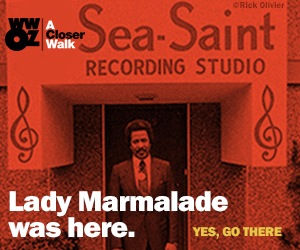 While Henry Gray has lived in the sleepy hamlet of Scotlandville, Louisiana, just north of Baton Rouge, for nearly 40 years, he is the obvious heir to the Chicago blues piano throne. Why, one might well ask? He gets the crown, via 25 years of playing in the Windy City during the golden age of Chicago blues. While he is best known for his lengthy tenure with Howlin’ Wolf, Gray also backed a virtual who’s who of legendary Chicago blues artists in the studio, and on the bandstand.
While Henry Gray has lived in the sleepy hamlet of Scotlandville, Louisiana, just north of Baton Rouge, for nearly 40 years, he is the obvious heir to the Chicago blues piano throne. Why, one might well ask? He gets the crown, via 25 years of playing in the Windy City during the golden age of Chicago blues. While he is best known for his lengthy tenure with Howlin’ Wolf, Gray also backed a virtual who’s who of legendary Chicago blues artists in the studio, and on the bandstand.
Gray’s style was, and still is, instantly recognizable. Rather than play chords like most of his contemporaries, Gray instead plays a busy cluster of notes on his right hand, overtop of the solid blues or boogie bass that he plays with his left hand. His style shone brightest on Wolf’s early 1960s recordings like, “Tail Dragger,” “Goin’ Down Slow” and “You’ll Be Mine.” But, even earlier, he enhanced Billy Boy Arnold’s, “I Wish You Would,” G. L. Crockett’s, “Look Out Mabel,” and Jimmy Rogers, “Blues All Day Long,” to name but a few.
Born January 19, 1923, at Kenner, La, he moved with his family to rural Alsen, La, when he was one year old. Little Henry began playing piano at the age of 10. He took formal lessons, but in 2002 he admitted, “There was no feeling in doing that.”
Gray’s parents were church-goers, and hoped their son would confine his playing to spirituals. However, at the age of 16 he was offered a job playing secular music at a local juke joint. Perplexed, his parents agreed when they realized their son was going to make a pocketful of money every night.
Gray had an aunt in Chicago, and in 1939, he visited her for a week. Taken aback by the active music scene there, he promised himself he’d soon be back. Unfortunately, WW II intervened and Gray found himself in the South Pacific until his honorable discharge in 1946.
“I was back in Louisiana a week and then took a train to Chicago,” said Gray. “My aunt was still there and I stayed with her a good while. I worked in a steel mill, but went to clubs at night. When I got there, I played with Big Bill Broonzy, Tampa Red and the Sonny Boy Williamson that got murdered.”
Gray would meed “Big” Maceo Merriweath, who became Gray’s biggest influence. He also hustled spare change with guys like Little Walter, playing music in Jew Town. In the early 1950s, he joined Little Hudson’s Shower’s Rain group which was a fixture at the Upstairs Lounge on the Southside.
In 1952, Gray entered the studio for the first time to accompany Jimmy Rodgers on his Chess recordings of, “Chicago Bound,” and “Blues All Day Long.”
“I went on the road with Jimmy,” said Gray. “He played with Muddy Waters. But when he had a record out that made a little noise, he’d leave and put a band together.”
The following year was a busy year for Gray as he backed Little Walter, Morris Pejoe and made his first solo recordings for the Checker label under the guise, “Little Henry,” The following year, he joined Little Walter’s Jukes on a cross country tour and recorded, “Who Will Be Next,” with Howlin’ Wolf, who had just recently moved north from Memphis.
The year 1955 remained a busy one for Gray as he split time between the Red Devil Trio and the Jukes. He also found time to record with Billy Boy Arnold—”I Wish You Would,” Jimmy Reed’s, “I Ain’t Got You,” and Jimmy Rodgers’, “Blues All Day Long.” Otis Spann was clearly Chess producer, Leonard Chess’, first choice on piano, but when Spann was on the road with Muddy Waters, Gray often got the call.
“I recorded with Junior Wells, Jimmy Reed, Billy Boy and Bo Diddley, but I was never part of their band,” specified Gray. “They saw me playing somewhere and asked me to make one of their sessions. Sometimes I’d make a gig with them if I could. Me, Spann and Little Johnnie Jones could work seven nights a week if we wanted to. Chicago was a piano players town back in the 1950s.”
In 1956, Gray only cut one session with Billy Boy Arnold at Vey Jay, but it marked the beginning of a 12 year tenure with Howlin’ Wolf.
“Wolf offered me more money than Walter so I went with him. He was quite strict but we got along okay. He had a .38, and I had a .38. You had to have one back then because we played in some pretty rough joints. Wolf was about business. Walter never was. Wolf bought the band uniforms—I had six different uniforms. Some musicians didn’t like Wolf telling them what to do and what to wear, but if it was your name out there, would you want a band behind you with their asses hanging out? He was professional and taught me a lot.
“Wolf was a good showman. He would crawl around on his hands and knees and drive the audience crazy. Hubert (Sumlin) was in the band when I joined. We played all over the south and west sides but we were the house band at Sylvio’s. When Wolf went on the road he took Hubert and left me to front the band because I could sing and hold a crowd.”
Gray played on scores of Wolf’s recordings and recalled they were arduous, often taking multiple takes, but occasionally quite humorous.
“Once he set his mind to doing something one way, it was had to get him to change,” said Gray. “We were in the studio cutting one of Willie Dixon’s songs, “Taildragger.” Wolf just couldn’t get the lyrics right. He kept singing, “I’m a tail dragger, I swipe out my tracks.” That just drove Leonard Chess crazy. He kept stopping us and yelling, ‘Damn Wolf. You don’t swipe out your tracks, you wipe out your tracks!’ It took over a dozen takes before Wolf got it right.”
Gray continued to pile up the studio credits, contributing brilliant piano backing on G. L. Crockett’s, “Look Out Mabel,” and Harold Burrage’s, “She Knocks Me Out.” In 1959, Gray brought a new sound to ensemble Chicago blues—at least in clubs—the electric piano.
“It was a Wurlitzer,” said Gray. “I played it through a Fender Bassman (amplifier). I got tired of playing torn up, out-of-tune pianos and playing around the bad notes. The worst was when we played clubs behind Muddy Waters. Spann destroyed pianos because he played so hard. He used to split the hammers on the piano some nights and they’d be all over the floor. I never recorded on the electric piano though because that wasn’t the sound the studios were looking for.”
In the early 1960s, most of Gray’s studio dates were in support of Howlin’ Wolf at Chess, although he took on an occasional outside session. In 1968, Wolf and Gray—two men with strong personalities parted forever.
“I had a few drinks one night and I was tired of Wolf’s petty bullshit,” said Gray. “I didn’t need the money, because I was getting a pension from the army. The day after I quit, I took the train back to Louisiana.”
After he got back to Louisiana, he picked up sporatic work plying music with Slim Harpo, Raful Neal, Silas Hogan and Tabby Thomas, but to make ends meet, Gray drove a bulldozer and worked as a roofer. In 1970, Lazy Lester took him to Crowley, Louisiana, where he recorded the spectacular single, “Lucky Lucky Man/You’re My Midnight Dream.” (This would make Gray the only musician to work under probably the three greatest blues record producers ever—Leonard Chess, Willie Dixon and J. D. Miller. The single alerted the world that Gray was still in the game. He was soon after recorded by Arhoolie and Blue Horizon, who put together Louisiana Blues anthologies. In the mid-1970s, Gray made the first of over 30 trips to Europe. In 1987, he made his first solo album, “They Call Me Little Henry,” which appeared on the German Blue Beat label. His first solo American album, “Lucky Man,” was released on Blind Pig in 1988. By then, Gray was a fixture on the American and European blues festival circuit, and a particular favorite at the New Orleans Jazz and Heritage Festival.
Now in his mid-80s, Gray remains very active and is enjoying the release of a new CD, “Times Are Gettin’ Harder,” issued on the Lucky Cat label. If you’re interested in checking out a legend, or hearing some authentic blues, Henry Gray will be appearing at the Ogden Museum October 15, 2009.




